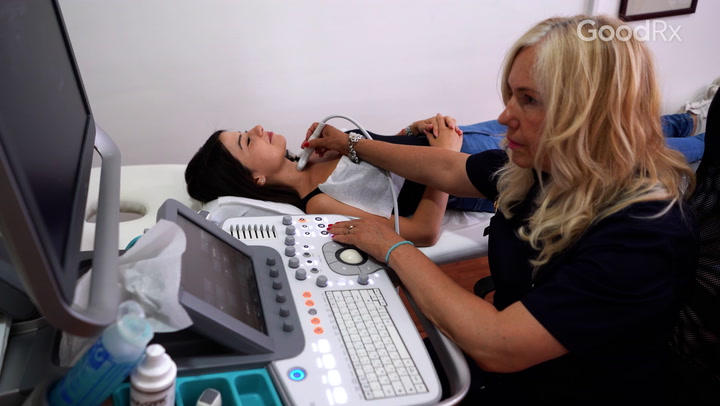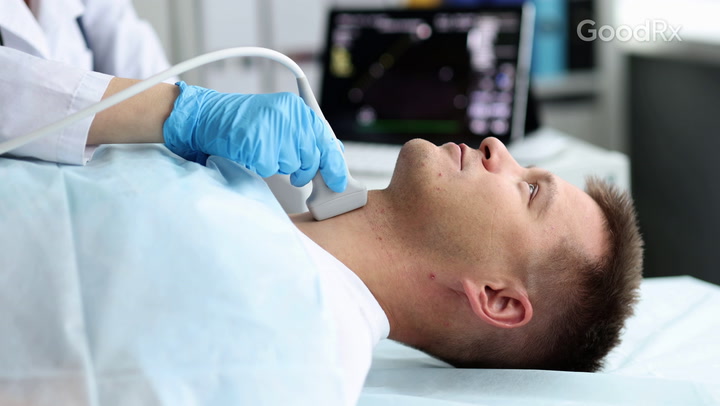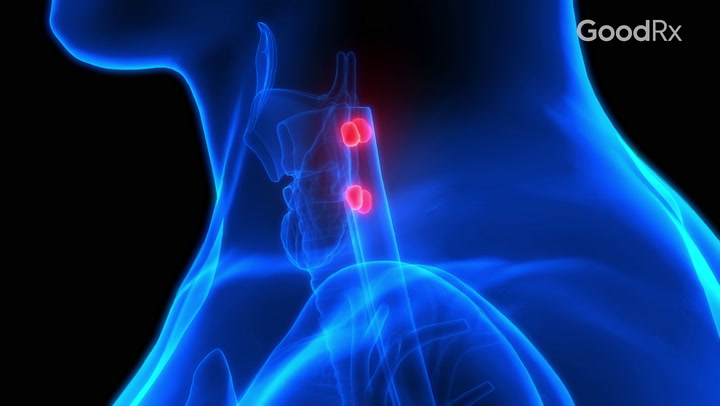
What Happens If You Leave Hypothyroidism Untreated?
Key takeaways:
Hypothyroidism can affect many body systems. But when treated, your symptoms can fully resolve.
Untreated hypothyroidism can lead to serious complications, including heart disease and nerve damage. In rare cases, it can be fatal.
Most people with hypothyroidism have to take thyroid hormone replacement long term. You’ll need ongoing thyroid level checks to ensure you’re on the right dose.
Access savings on related medications
If you have hypothyroidism, you’re not alone. In fact, about 5 out of every 100 people in the U.S. have it. Fortunately, it’s easy to correct for most people. But leaving hypothyroidism untreated can cause trouble. That’s because your thyroid gland affects almost every one of your bodily functions.
When your thyroid gland is underactive, it can be tough to put the signs together to recognize the issue. And without treatment, an underactive thyroid can cause serious mental and physical health problems.
Let’s take a closer look at what happens if you leave hypothyroidism untreated and at the most common complications.
Save over 40% on Qsymia with GoodRx
Discover the once daily Qsymia for weight management. Qsymia is for adults and children 12-17 in combination with a healthy diet and regular exercise.

What happens if you leave hypothyroidism untreated?
Untreated hypothyroidism can lead to serious mental and physical health problems. Let’s review the complications of untreated hypothyroidism below.
Mental health changes
Hypothyroidism affects your mind as well as your body. It can slow your thoughts, make you forgetful, and affect your ability to concentrate. In fact, hypothyroidism is one of the reversible causes of dementia.
Not having enough thyroid hormone puts a damper on your emotional well-being too. You could experience more mood swings and irritability. People with hypothyroidism might be more likely to have anxiety and depression. If you already suffer from depression, being hypothyroid can make it harder to treat.
Goiter
An underactive thyroid might become enlarged (goiter). Goiters are usually painless lumps in the front of your neck. They can cause you to cough, make your voice hoarse, and affect your breathing and swallowing. If the goiter is small and doesn’t cause symptoms, it may not need to be treated. Treatment, if necessary, usually consists of medication or surgery.
Heart disease
Having an underactive thyroid can increase your risk of heart disease. It can have a direct effect on the heart, making it beat slower and less efficiently. And it also has an effect on the coronary arteries, affecting proper blood flow. This raises the risk of coronary artery disease and congestive heart failure. If you have heart disease already, hypothyroidism can make it worse.
Nerve damage
Long-term hypothyroidism can damage nerves. You might feel symptoms like:
Pain
Numbness
Tingling
Weakness, most commonly in the hands
Can your diet affect your thyroid hormone levels? Here are foods you should eat (and avoid) when you have hypothyroidism.
Is weight gain really a sign of hypothyroidism? Yes, but it’s not as much as you may think. Here’s how much weight gain you can expect from an underactive thyroid.
Do you need hypothyroidism screening? Find out when your symptoms should prompt you to get testing for your thyroid.
The nerves of the hand travel through a narrow channel in the wrist called the carpal tunnel. Carpal tunnel syndrome can result from hypothyroidism causing inflammatory changes in the tunnel. This can hurt the nerves inside. Nerve damage from untreated hypothyroidism can also cause hearing loss.
Is untreated hypothyroidism life-threatening?
If severe hypothyroidism isn’t treated for a long time, it can be life-threatening. Myxedema coma can happen when the body systems slow down so much that you’re left in a coma. Even with treatment, many people don’t survive. The good news is that it’s easy to detect and treat hypothyroidism, so getting to this point is very rare.
What are the primary causes of hypothyroidism?
Hypothyroidism occurs when the thyroid doesn’t make enough thyroid hormone to meet the body’s needs. While it can affect anyone (including children), people over the age of 60 are at especially high risk. Other important risk factors are listed below.
Medications
Certain medications can affect your thyroid hormone levels. Some common ones are:
Amiodarone (Pacerone)
Bexarotene (Targretin)
Antidepressants (like sertraline)
Anti-seizure medicines (like carbamazepine, phenytoin, and phenobarbital)
Thyroid surgery
A thyroidectomy is a procedure where you have all or part of your thyroid removed. After a thyroidectomy, it’s possible that the remaining tissue may not produce enough thyroid hormones for your body. In some cases, you may still have thyroid tissue in place after thyroid surgery. But what’s left might not be able to make enough hormones for your body.
A history of hyperthyroidism
Hyperthyroidism is an overactive thyroid. It can have just as many health consequences as an underactive thyroid, and it needs treatment as well. Previous treatment for hyperthyroidism or burnout of an overactive thyroid gland can eventually lead to low thyroid hormone levels. Also, an overactive thyroid can burn itself out over time and have a hard time producing thyroid hormone.
Radiation to areas around the thyroid
Radiation for treatment of head and neck cancers can damage the thyroid gland as a side effect. The same radiation beams that kill the cancer cells can also damage the body’s normal tissues. This can lead to your thyroid gland functioning poorly, resulting in hypothyroidism.
Family history of hypothyroidism
Hypothyroidism tends to run in families. You have a higher chance of developing hypothyroidism if your family members have it — specifically close family members like parents, grandparents, or siblings.
Pregnancy
The hormonal changes during pregnancy can cause changes to the thyroid gland. Pregnancy also makes you more likely to develop autoimmune thyroid issues. You can also develop autoimmune thyroid issues after pregnancy — where your immune system attacks your thyroid gland. Postpartum thyroiditis is an autoimmune condition much like Hashimoto’s thyroiditis (where the body attacks and creates antibodies against the thyroid). It can occur up to 1 year after pregnancy.
An autoimmune condition
Having one autoimmune disease increases your chances of getting another one — like autoimmune hypothyroidism. Autoimmune diseases include conditions like:
Alopecia areata (hair loss)
Vitiligo (loss of skin color)
Pernicious anemia (decrease in red blood cells).
Iodine deficiency
Not getting enough iodine in your diet (iodine deficiency) can lead to thyroid issues. That’s because without iodine, the thyroid gland can’t make thyroid hormone.
Iodine deficiency is a global problem. However, it’s rare in the U.S., because iodine is added to salt and other foods.
How does untreated hypothyroidism affect fertility and pregnancy?
Hypothyroidism can affect your fertility and make it harder to get pregnant. It can make your period irregular, which means you won’t be able to track ovulation. Or it can prevent you from ovulating altogether. The good news is that if hypothyroidism is causing you to be infertile, it can be easily treated. Studies show that over 75% of women who couldn’t conceive due to hypothyroidism were able to get pregnant after getting treatment.
During pregnancy, insufficient thyroid hormone can be dangerous for both the mother and the baby. And there’s a higher risk of miscarriage. You may also be at risk of other pregnancy complications like:
High blood pressure
Anemia (low red blood cell count)
Bleeding (hemorrhage)
Placental abruption (early separation)
Higher levels of thyroid hormones are needed to meet the demands of pregnancy. Without treatment, hypothyroidism can affect the baby’s development. There might be a higher risk of complications, like:
Preterm birth
Low birth weight
Respiratory distress
Stillbirth
In addition, studies have found that the IQ scores of children born to hypothyroid mothers can be lower than those born to mothers with normal thyroid hormone levels. While this may sound scary, the risks to moms and babies are avoidable with the right treatment.
How is hypothyroidism treated?
Hypothyroidism isn’t curable, but it’s totally correctable. Synthetic thyroxine is recommended for hypothyroidism. It mimics the hormones released by your thyroid gland. The most common synthetic thyroxine medication used to treat hypothyroidism is levothyroxine (L-thyroxine, Synthroid, Levoxyl, Levothroid, Tirosint, and Unithroid).
The dose depends on factors like:
Thyroid hormone level
Age
Weight
Medical history
Gender
A healthcare professional will estimate your starting dose and watch your thyroid hormone levels. They’ll make adjustments if they need to.
How do you know if you’re on the right dose of thyroid medication?
A healthcare professional will monitor your thyroid levels regularly to find the right medication dose for you. This can take some adjustment. If your TSH is too high while taking your thyroid medications, your dose might have to be increased. If it’s too low, your dose may be reduced.
Your prescriber might also change your dose because of symptoms you might be having. Fatigue, cold sensitivity, and dry skin can suggest that your dose is too low. Meanwhile, shakiness, irritability, and weight loss can suggest that your dose is too high. The right dose should eliminate symptoms.
Lastly, the right dose for you can change over time. Make sure to have regular follow-ups with your prescriber to ensure that your thyroid symptoms are controlled and your hormone levels are where they should be.
Can hypothyroidism go away without treatment?
Most people with hypothyroidism will need to take levothyroxine for life. But if your hypothyroidism is due to other conditions that are reversible, it may improve. Common causes of hypothyroidism that can go away include:
Pregnancy
Medications
Autoimmune thyroiditis
Iodine exposure
Frequently asked questions
When treated properly, people with hypothyroidism have a normal life expectancy. Untreated or poorly managed hypothyroidism may increase the risk of heart disease and other health issues, though, which can reduce your lifespan. Regular monitoring of your thyroid hormone levels can help make sure you avoid any serious complications.
Hypothyroidism symptoms can be subtle and can be mistaken for stress, aging, or lifestyle factors. Common signs include:
Low energy
Unexplained weight gain
Dry skin
Hair loss
Brittle nails
Irregular periods
Other symptoms may involve:
Feeling cold
Forgetfulness
Tingling sensations
Swelling
Cramps
Constipation
Decreased libido
If you notice these changes, listen to your body and discuss them with a healthcare professional.
Hypothyroidism is diagnosed through a blood test called thyroid-stimulating hormone (TSH). A high TSH level indicates low thyroid hormone levels. If you have high TSH levels on a blood test, your healthcare team will order more tests to confirm the diagnosis and to look for its cause.
The bottom line
Hypothyroidism is easy to diagnose and treat. The hard part is realizing that your symptoms might be coming from your thyroid. If you regularly feel fatigued, cold, or irritable, let a healthcare professional know. Getting treatment early can prevent complications of untreated hypothyroidism. This is especially important if you’re planning a pregnancy or have risk factors.
Why trust our experts?



References
American Thyroid Association. (n.d.). Hypothyroidism.
Arafah, B. M. (2001). Increased need for thyroxine in women with hypothyroidism during estrogen therapy. The New England Journal of Medicine.
Biban, B. G., et al. (2017). Iodine deficiency, still a global problem?. Current Health Sciences Journal.
Gupta, N., et al. (2016). Peripheral and central nervous system involvement in recently diagnosed cases of hypothyroidism: An electrophysiological study. Annals of Medical & Health Sciences Research.
Hage, M. P., et al. (2011). The link between thyroid function and depression. Journal of Thyroid Research.
Haugen, B. R. (2009). Drugs that suppress TSH or cause central hypothyroidism. Best Practice & Research Clinical Endocrinology & Metabolism.
Jonklaas, J., et al. (2014). Guidelines for the treatment of hypothyroidism: Prepared by the American Thyroid Association Task Force on thyroid hormone replacement. Thyroid.
Klein, I., et al. (2007). Thyroid disease and the heart. Circulation.
Koyyada, A., et al. (2020). Role of hypothyroidism and associated pathways in pregnancy and infertility: Clinical insights. Tzu Chi Medical Journal.
Lai, E. C., et al. (2013). Use of antiepileptic drugs and risk of hypothyroidism. Pharmacoepidemiology and Drug Safety.
Leung, A. M. (2016). Thyroid emergencies. Journal of Infusion Nursing.
National Institute of Diabetes and Digestive and Kidney Diseases. (2021). Hypothyroidism (underactive thyroid). National Institutes of Health.
Nazarpour, S., et al. Thyroid dysfunction and pregnancy outcomes. Iranian Journal of Reproductive Medicine.
Patel, D. D., et al. (2021). Hypothyroidism and carpal tunnel syndrome. American Association for Hand Surgery.
Rad, S. N., et al. (2023). Postpartum thyroiditis. StatPearls.
Sahay, R. K., et al. (2012). Hypothyroidism in pregnancy. Indian Journal of Endocrinology and Metabolism.
Tsai, Y., et al. (2020). Association between sudden sensorineural hearing loss and preexisting thyroid diseases: A nationwide case-control study in Taiwan. International Journal of Environmental Research and Public Health.
Wieland, D. R., et al. (2022). Thyroid disorders and dementia risk. Neurology.
Wiersinga, W. M. (2014). Adult hypothyroidism. Endotext. MDText.

























